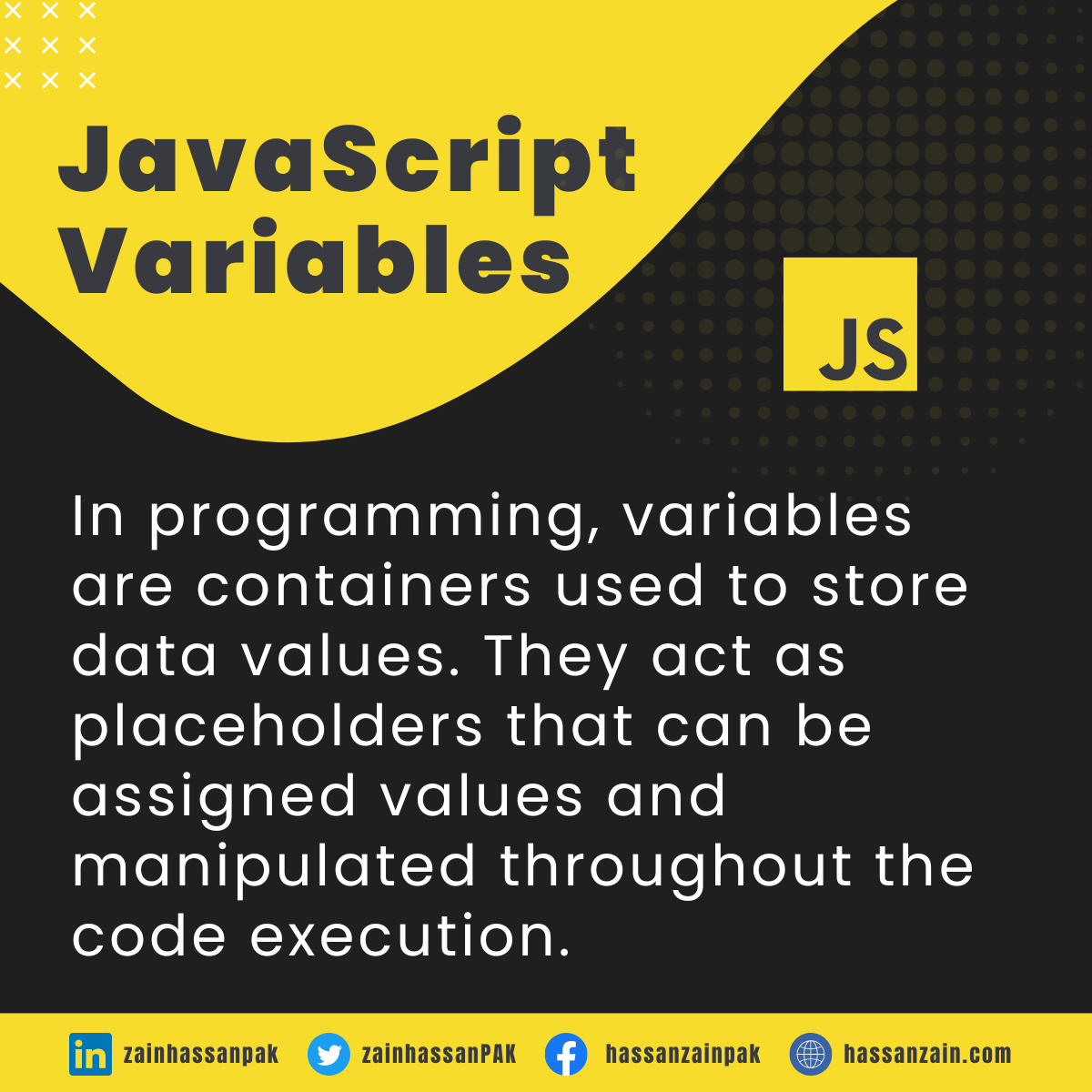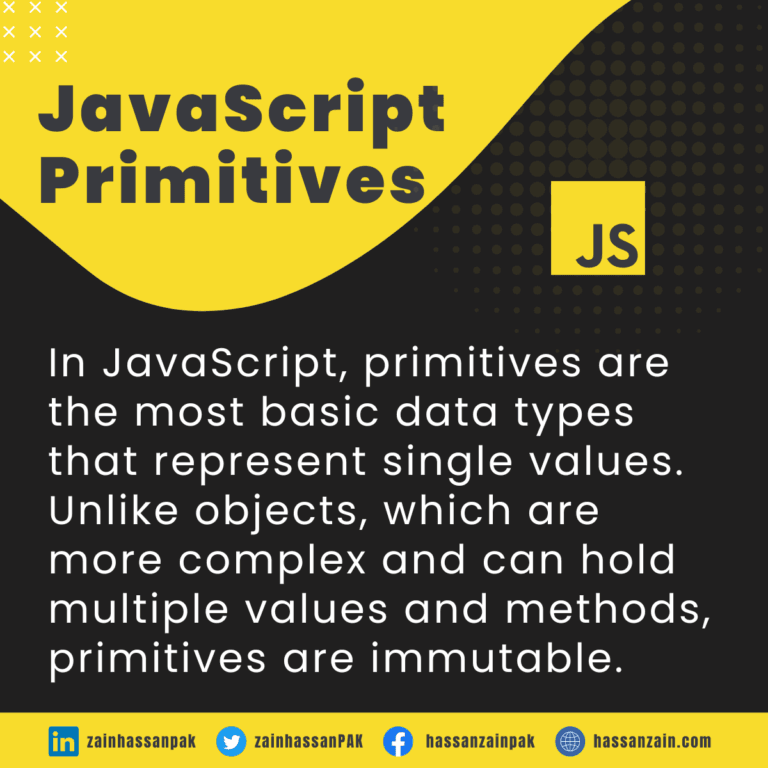JavaScript variables are the building blocks of dynamic web development.
In this guide, we’ll explore JavaScript variables, their types, and how to use them effectively. Whether you’re a seasoned developer or just starting your coding journey, understanding variables is essential. Let’s dive in!
What are JavaScript Variables?
Variables are containers used to store data values. They act as placeholders that can be assigned values and manipulated throughout the code execution.
In JavaScript, variables are dynamically typed, meaning the type of data they hold can change during the program’s execution.
Rules for Naming Variables:
When naming variables in JavaScript, adhering to the following guidelines is of utmost importance:
- In JavaScript, variable names are restricted to using letters, numbers, underscores, or dollar signs.
- The requirement dictates that variable names in JavaScript must commence with either a letter or an underscore, not a number.
- JavaScript is case-sensitive, so ‘age’ and ‘Age’ are considered as different variables.
- Avoid using reserved keywords (e.g., ‘function’, ‘let’, ‘const’) as variable names.
Declaring Variables:
In JavaScript, variables must be declared using one of three keywords: let, var, or const, before they can be used.
var:
Historically, var was the only keyword used for variable declaration in JavaScript. However, it has some scope-related issues and is now considered outdated.
JavaScript variables declared using var in JavaScript have function-level scope, meaning they are accessible only within the function in which they are declared or as global variables if declared outside any function.
var age = 30;let:
ES6, commonly referred to as ECMAScript 6, brought in the ‘let’ keyword, offering block-level scoping for JavaScript variables.
This enhancement ensures more predictable behavior for variables used within blocks, such as loops or conditionals. Unlike ‘var,’ ‘let’ allows variables to be reassigned within their respective scopes.
let username = 'JohnDoe';const:
Introduced in ECMAScript 6 (ES6), the const keyword serves the purpose of declaring constants, preventing any re-assignment after the initial value assignment.
Similar to let, const is block-scoped, ensuring that its accessibility is limited to the specific block in which it is declared.
const PI = 3.14;Understanding Variable Scopes:
Scoping in JavaScript pertains to how variables’ accessibility varies across different segments of the code. This language has three distinct types of JavaScript variable scopes.
Global Scope:
JavaScript variables declared outside of any function or block are considered global and are accessible throughout the entire codebase.
Professionals should be cautious when using global variables to avoid unintended side effects and potential naming conflicts.
var num1 = 10;
var num2 = 20;
function addNumbers() {
var sum = num1 + num2;
return sum;
}
var result = addNumbers();
console.log("The sum is: " + result); // Output: "The sum is: 30"
Function Scope:
JavaScript variables declared within a function using the keyword var have a scope that is confined to that particular function.
Once the function completes its execution, variables declared within it cannot be accessed from outside and are subsequently destroyed.
function addNumbers(a, b) {
var sum = a + b; // 'sum' is a function-scoped variable, only accessible within this function.
console.log("The sum is: " + sum);
}
addNumbers(5, 10); // Output: The sum is: 15
// Attempting to access the 'sum' variable outside the function will result in an error.
// console.log(sum); // This will throw a ReferenceError: sum is not defined.Block Scope:
JavaScript variables declared using let and const within a block (e.g., inside loops or conditional statements) are confined to that specific block, providing a more controlled and predictable scope.
function calculateSum(numbers) {
let sum = 0; // Initialize the 'sum' variable within the function's block scope
for (let i = 0; i < numbers.length; i++) {
// 'i' is also block-scoped within the 'for' loop
sum += numbers[i];
}
// The 'sum' variable is accessible only within the function's block scope
return sum;
}
// Example usage:
const numbersArray = [1, 2, 3, 4, 5];
const result = calculateSum(numbersArray);
console.log(result); // Output: 15Assignment Operator(=):
JavaScript utilizes the assignment operator (=) to assign values to JavaScript variables. It allows professionals to set or update the content of variables with ease.
For example, “let score = 100;” assigns the value 100 to the variable “score.” This fundamental operator is crucial for efficient variables management in JavaScript.
let age = 30; // Assigns the value 30 to the variable 'age'JavaScript Variable Types:
number:
Represents numerical data, encompassing both whole integers and decimal floating-point numbers.
string:
Represents a sequence of characters, enclosed in single or double quotes.
Boolean:
Represents true or false values.
null:
Represents an intentional absence of value.
undefined:
Represents an unintentional absence of value.
symbol:
Represents unique, immutable values used as object property keys (introduced in ECMAScript 6).
bigint:
Introduces support for handling arbitrarily large integers natively in JavaScript (added in ECMAScript 11).
object:
Represents complex data structures, such as arrays, functions, and objects.
Constants and Immutability:
When declaring a JavaScript variable, developers have the option to choose between two keywords: “let” and “const.”
While “let” permits the reassignment of values, “const” establishes read-only variables that remain unchangeable after initialization.
Embracing constants enhances code predictability and helps prevent accidental value mutations, promoting immutability where possible.
Conclusion:
For JavaScript developers aiming to excel in their craft, achieving mastery over variables is imperative for crafting code that is both efficient and maintainable.
Understanding JavaScript variables types, scoping rules, and embracing best practices like immutability will significantly improve your coding skills and empower you to create robust and scalable JavaScript applications.
Delve into the realm of JavaScript variables, unravel their intricacies, and harness their complete potential to craft extraordinary software solutions.


